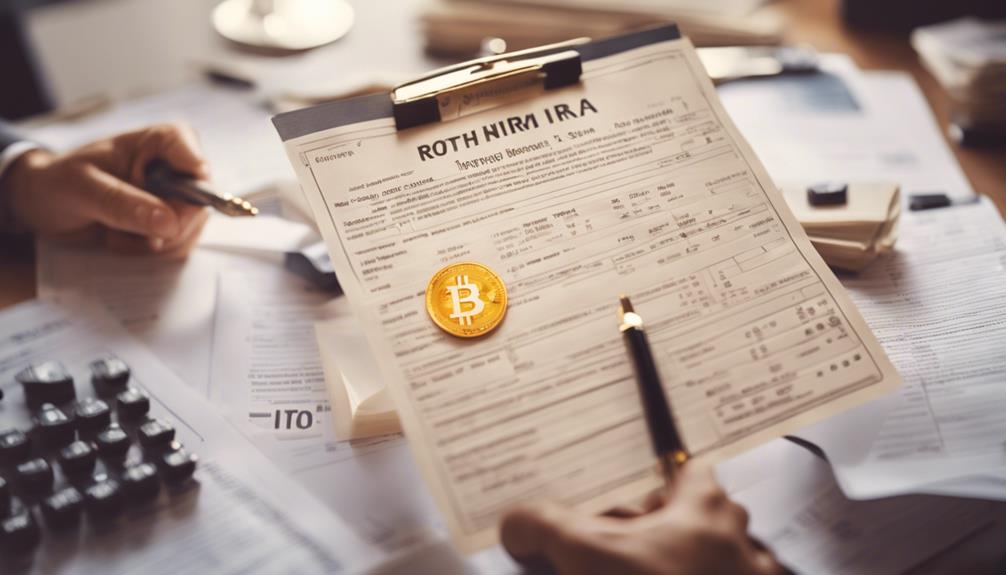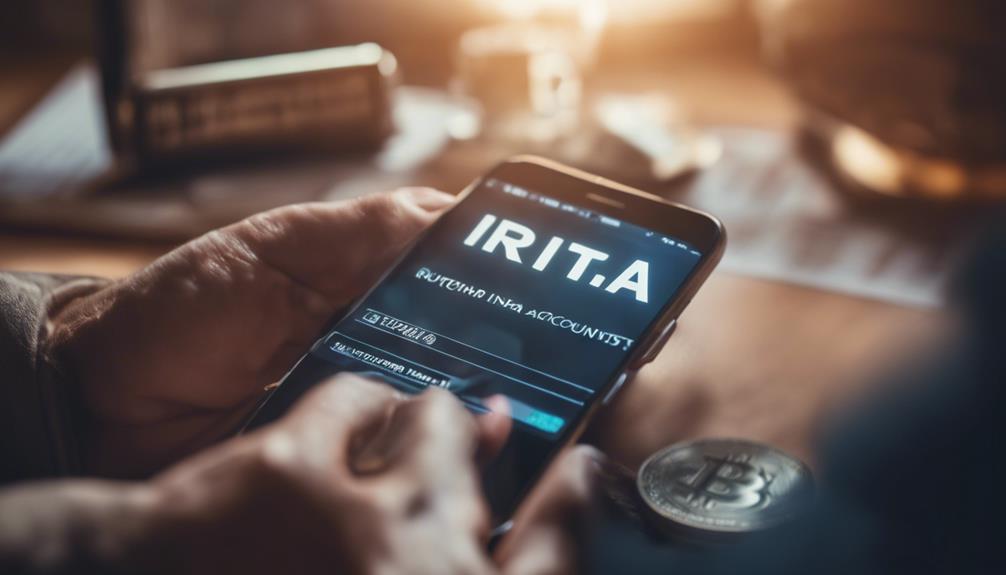Yes, you can purchase Bitcoin within your Roth IRA. This approach can bring significant tax advantages and enable your investments to grow tax-free inside the account. Bitcoin held in a Roth IRA is taxed similarly to traditional assets by the IRS. It is important to note that contributions to Roth IRAs must be in the form of cash. It is crucial to understand the regulations and risks associated with cryptocurrency investments. Ensure that you meet the IRS criteria, choose a custodian that supports cryptocurrency investments, compare fees, and align with your investment objectives. This strategy can help diversify your retirement portfolio and potentially boost returns.
Key Takeaways
- Roth IRAs allow investing in Bitcoin.
- Choose a custodian supporting cryptocurrency.
- Contributions must be in cash, not crypto.
- Understand tax implications and regulations.
- Ensure compliance with IRS rules.
Tax Benefits of Bitcoin in Roth IRA

When investing in Bitcoin within your Roth IRA, you can benefit from tax advantages that allow for potential growth without tax implications. Roth IRAs offer unique tax benefits for retirement savings, and including Bitcoin in your investment portfolio can further enhance these advantages. By holding Bitcoin in a Roth IRA, your investments can grow tax-free, providing an opportunity for potential gains without worrying about tax consequences. Additionally, under certain conditions, Roth IRAs allow for tax-free withdrawals, making them an attractive option for long-term investments like Bitcoin.
Integrating Bitcoin into your Roth IRA not only diversifies your investment holdings but also opens up opportunities for potential growth in the cryptocurrency market. While contributions to Roth IRAs must be made in cash, once the funds are in the account, you can invest in various assets, including Bitcoin. The IRS treats Bitcoin in a Roth IRA similarly to traditional stocks and bonds for tax purposes, making it a viable option for those looking to expand their retirement savings with a tax-efficient strategy.
Risks of Cryptocurrency Investments

Investing in cryptocurrencies within your Roth IRA carries inherent risks you should be aware of. Cryptocurrency markets are known for their extreme volatility, leading to the potential for significant financial losses.
Additionally, concerns surrounding cybersecurity threats, regulatory changes, and market manipulation add to the complexity of investing in digital assets.
Cryptocurrency Volatility Risks
Amid the excitement of potentially high returns, it's important to acknowledge the significant risks posed by cryptocurrency volatility when considering investments for your Roth IRA. Cryptocurrency investments are known for their extreme and unpredictable price fluctuations, making them highly volatile.
The value of cryptocurrencies can change rapidly and substantially within short periods, exposing investors to the risk of losing a significant portion of their investment. Factors such as regulatory changes, market sentiment, and technological developments can all influence cryptocurrency markets, leading to market fluctuations.
Understanding and effectively managing these risks are essential for individuals looking to incorporate cryptocurrencies into their Roth IRA investment strategy. It's vital to stay informed and exercise caution when dealing with the volatile cryptocurrency market to protect your investment.
Security Concerns in Crypto
Safeguard the safety of your cryptocurrency investments by addressing the prevalent security concerns in the crypto domain, which include hacking, fraud, and a lack of regulatory oversight. To protect your holdings, secure your private keys and use reputable wallets. Risks such as theft and loss are heightened in the cryptocurrency sphere due to the irreversible nature of transactions and the pseudonymous characteristics of blockchain technology. Lack of insurance coverage and limited recourse options amplify the potential consequences of security breaches. Without regulatory oversight, investors face challenges in seeking legal remedies or protection. Stay vigilant and prioritize security measures to mitigate the risks associated with cryptocurrency investments.
| Security Concerns | Description |
|---|---|
| Hacking | Unauthorized access to digital assets. |
| Fraud | Deceptive practices for financial gain. |
| Regulatory Oversight | Lack of official supervision and guidelines. |
Regulatory Uncertainties in Crypto
In the ever-changing landscape of cryptocurrency, maneuvering regulatory uncertainties poses significant risks for investors in the crypto market. Here are some key points to keep in mind regarding regulatory uncertainties in the crypto space:
- Lack of clear regulations can lead to market instability and legal uncertainties in the crypto market.
- Regulatory changes have the potential to impact the value and legality of cryptocurrencies, affecting investments in Roth IRAs.
- Staying informed about regulatory developments is vital for investors in cryptocurrencies to mitigate risks.
- Uncertainties in regulations may impact the tax treatment and overall viability of holding cryptocurrencies in Roth IRAs.
Navigating the regulatory environment is essential for those contemplating crypto investments in their Roth IRAs.
How to Open a Bitcoin Roth IRA

To open a Bitcoin Roth IRA, you must first meet the eligibility requirements for investing in Bitcoin within your retirement account.
The next step involves funding your Bitcoin Roth IRA by selecting a custodian that allows cryptocurrency investments and providing them with your personal and banking details for account setup.
Make sure the custodian aligns with your investment goals and offers a variety of cryptocurrencies, and compare fees to safeguard your retirement savings goals.
Eligibility Requirements for Bitcoin
Meeting the eligibility requirements to open a Bitcoin Roth IRA involves satisfying IRS criteria for earned income and adhering to contribution limits. When considering investing in Bitcoin within a Roth IRA, keep in mind the following:
- Make sure you have earned income to qualify for a Roth IRA.
- Check that your income falls within the limits set by the IRS for Roth IRA contributions.
- Be aware that the maximum contribution limit for a Roth IRA in 2021 is $6,000 for individuals under 50 and $7,000 for those 50 and older.
- Remember that contributions to a Roth IRA must be made in cash and can't be directly funded by Bitcoin or other cryptocurrencies.
Steps to Fund Bitcoin
When considering funding Bitcoin in a Roth IRA, make sure to open a self-directed IRA with a custodian that supports cryptocurrency investments. Verify that the custodian offers Bitcoin as an investment option within the Roth IRA account.
Provide necessary personal information and funding details to set up the Bitcoin Roth IRA. Research and compare fees associated with purchasing and holding Bitcoin in the Roth IRA.
Once the account is set up, you can buy Bitcoin through the custodian's platform to fund your Roth IRA. Be diligent in understanding the platform's fees and funding process to make informed investment decisions.
Ensure compliance with all IRS regulations regarding Bitcoin investments within a Roth IRA.
Diversifying Your Retirement Portfolio

Diversifying your retirement portfolio is essential for minimizing risk and maximizing potential returns. Consider the following when thinking about diversification in your Roth IRA:
- Spread Your Investments: By including various asset classes like stocks, bonds, and potentially Bitcoin, you can reduce the impact of market volatility on your portfolio.
- Hedge Against Risks: Bitcoin's low correlation with traditional investments offers a hedge against market fluctuations, potentially safeguarding your retirement savings.
- Explore High Return Opportunities: Adding Bitcoin to your Roth IRA can expose you to potential high returns in the cryptocurrency market, diversifying your portfolio's growth potential.
- Consult a Financial Advisor: To align your investment choices with your goals and risk tolerance, seek guidance from a financial advisor. They can help determine if Bitcoin is a suitable addition to your retirement portfolio.
Regulations on Bitcoin in IRAs

When considering regulations on Bitcoin in IRAs, it's important to understand that the IRS views cryptocurrencies as property within retirement accounts.
Contributions to Roth IRAs must be in cash, not in the form of cryptocurrencies, although some traditional IRA providers may allow adding cryptocurrency.
To invest in Bitcoin within your Roth IRA, you can purchase the cryptocurrency, and any gains are taxed similarly to other traditional investments like stocks and bonds.
IRA Bitcoin Regulations
Considering the IRS classifies cryptocurrencies as property in retirement accounts, understanding the regulations on including Bitcoin in IRAs is essential for investors seeking to diversify their portfolios. Here are some key points to keep in mind:
- Contributions to Roth IRAs must be made in cash, not cryptocurrency.
- Few traditional IRA providers allow adding cryptocurrency.
- Cryptocurrency can be added to Roth IRAs through purchase.
- Crypto held in Roth IRAs is taxed similarly to stocks and bonds.
Being aware of these regulations can help you navigate the process of incorporating Bitcoin into your IRA effectively while staying compliant with tax laws.
Investing Rules for Bitcoin
When investing in Bitcoin within your Roth IRA, it's crucial to comprehend the specific regulations governing the inclusion of cryptocurrencies in retirement accounts. The IRS considers cryptocurrencies as property, permitting their inclusion in retirement accounts since 2014.
While contributions to Roth IRAs must be made in cash, not in cryptocurrency form, some self-directed IRAs support adding cryptocurrencies. Adding cryptocurrency to a Roth IRA involves purchasing it since the IRS views it as property.
However, holding cryptocurrency in a Roth IRA requires adherence to IRS rules and may come with higher fees compared to traditional investments. It's imperative to take these factors into account before incorporating Bitcoin or other cryptocurrencies into your retirement portfolio.
Security Considerations for Crypto Investments

For enhanced security when investing in cryptocurrencies, particularly in a Bitcoin Roth IRA, it's important to prioritize robust security measures and safeguards. Here are some key security considerations to keep in mind:
- Insurance Coverage: Custodial assets in a Bitcoin Roth IRA are insured up to $700 million, providing an additional layer of security and protection for your investments.
- Encryption: Encryption is utilized to secure sensitive data and transactions, ensuring that your information remains confidential and secure from unauthorized access.
- Multi-Factor Authentication: Implementing multi-factor authentication adds an extra level of security by requiring multiple forms of verification before granting access to your BitcoinIRA account.
- Compliance Standards: BitcoinIRA maintains strict compliance standards, including SOC 2 Type 2 certification, independent audits, and adherence to regulatory requirements, ensuring the security and integrity of your investments against potential cyber threats.
Potential Returns With Crypto in Roth IRA

Investing in Bitcoin within your Roth IRA presents the opportunity for potential tax-free growth and diversification of your retirement portfolio. By including Bitcoin in your Roth IRA, you can take advantage of the high growth potential that cryptocurrencies offer. This can help you align with your long-term investment goals and enhance your retirement planning strategies. Holding Bitcoin in a Roth IRA allows for tax-free withdrawals of investment gains, contributing to the overall benefits of this retirement account. Diversifying your retirement portfolio with Bitcoin can provide exposure to a different asset class, potentially increasing your overall returns while spreading out risk.
| Benefits of Investing in Bitcoin in Your Roth IRA | ||
|---|---|---|
| Tax-Free Growth | Diversification of Portfolio | Potential High Returns |
| Aligns with Long-Term Investment Goals | Retirement Planning Strategies | Cryptocurrency Exposure |
Choosing a Bitcoin IRA Provider

When selecting a Bitcoin IRA provider, prioritize security and reliability to safeguard your retirement investments effectively. Here are some key factors to take into account when choosing a provider:
- Security Measures: Look for providers that offer robust security measures such as cold storage for cryptocurrencies and insurance on custodial assets to protect your investments from potential risks.
- Fees: Compare the fee structures of different providers to make sure you're getting the best value for your money. Watch out for hidden fees that could eat into your retirement savings over time.
- Supported Cryptocurrencies: Make certain that the provider offers a variety of cryptocurrencies beyond just Bitcoin, allowing you to diversify your portfolio within your Roth IRA.
- Account Types: Consider the different types of accounts offered by each provider and choose one that aligns with your investment goals and risk tolerance, enabling you to maximize the benefits of investing in cryptocurrencies through your Roth IRA.
Contribution Limits for Crypto in IRAs

When considering investing in cryptocurrencies within your Roth IRA, it's important to be aware of the contribution limits set by the IRS. The IRS currently sets annual contribution limits for Roth IRAs at $6,000 for individuals under 50 years old and $7,000 for those aged 50 and above.
It's imperative to note that contributions to Roth IRAs can only be made in cash and not in cryptocurrencies like Bitcoin. Any cryptocurrency holdings in a Roth IRA are subject to the same contribution limits as traditional assets. To maintain the tax advantages associated with Roth IRAs, contributions must comply with IRS regulations.
Understanding these contribution limits is vital for effectively managing assets in your Roth IRA, including any cryptocurrency holdings. Make sure you stay within the set limits to maximize the benefits of your Roth IRA while incorporating cryptocurrency investments into your overall asset management strategy.
Future Outlook for Bitcoin in Retirement Accounts

Considering the potential for tax-free growth and diversification, Bitcoin in retirement accounts offers a promising outlook. When thinking about the future of Bitcoin in your retirement savings, here are some key points to keep in mind:
- Tax Benefits: Holding Bitcoin in retirement accounts like self-directed IRAs can provide tax advantages, allowing your investment to grow without immediate tax implications.
- Regulatory Uncertainty: The future outlook hinges on regulatory developments, as changes in rules could impact how Bitcoin is held and taxed within retirement accounts.
- Volatility Concerns: Bitcoin's price volatility may affect the stability of your retirement savings, especially in accounts like Roth IRAs where long-term growth is important.
- Consulting a Professional: It's wise to consult with a financial advisor to understand the risks and benefits of holding Bitcoin in your retirement accounts, ensuring you make informed decisions tailored to your financial goals.
Frequently Asked Questions
What Happens if You Invest $100 in Bitcoin Today?
If you invest $100 in Bitcoin today, the amount you'd own would be approximately 0.003 BTC at the current market price.
The value of your investment can fluctuate due to the volatile nature of cryptocurrency markets. Bitcoin's price history shows significant fluctuations, impacting your initial investment.
It's important to acknowledge the risks associated with cryptocurrency investments and seek advice from a financial advisor before making decisions.
What Is the Best Way to Invest in Bitcoin?
The best way to invest in Bitcoin involves careful consideration of your financial goals, risk tolerance, and investment timeline. Research different platforms like exchanges or investment apps to find one that aligns with your needs.
Stay updated on market trends and regulatory changes to make informed decisions. Diversify your portfolio to mitigate risks associated with cryptocurrency volatility.
Consult with financial experts to develop a well-rounded investment strategy that suits your individual circumstances.
Can I Buy Bitcoin in a Self-Directed Ira?
Yes, you can purchase Bitcoin in a self-directed IRA. This allows you to diversify your retirement portfolio beyond traditional assets. By investing in Bitcoin through a self-directed IRA, you can potentially benefit from its growth while enjoying tax advantages.
Specialized custodians oversee these investments, ensuring compliance with regulations. Consider exploring this option for a more diverse and potentially rewarding retirement strategy.
Can I Buy Bitcoin ETF in Vanguard Roth Ira?
In a Vanguard Roth IRA, purchasing Bitcoin ETFs isn't an option. However, exploring alternative platforms like Fidelity or Schwab could offer limited access to Bitcoin-related investments. These ETFs track Bitcoin's price, providing exposure to cryptocurrency within retirement accounts.
Before diving in, thorough research and advice from a financial advisor are essential. Remember, not all investment platforms support cryptocurrency, so choose wisely for your Roth IRA.
Conclusion
To sum up, when contemplating, it's crucial to buying Bitcoin in your Roth IRA can offer tax benefits and potential returns, but it also comes with risks and regulations.
Diversifying your retirement portfolio with cryptocurrency can be a strategic move, but it's vital to choose a reputable Bitcoin IRA provider and be aware of contribution limits.
The future outlook for Bitcoin in retirement accounts is uncertain, so it's critical to do thorough research before making any investment decisions.
Are you prepared to explore the possibilities of adding Bitcoin to your retirement savings?
Sarah develops and leads our educational initiatives to help clients understand the intricacies of investing in gold and cryptocurrencies. Her role is vital in ensuring that our clients are well-informed and confident in their investment decisions. Sarah’s expertise and commitment to education are key to empowering our clients.










